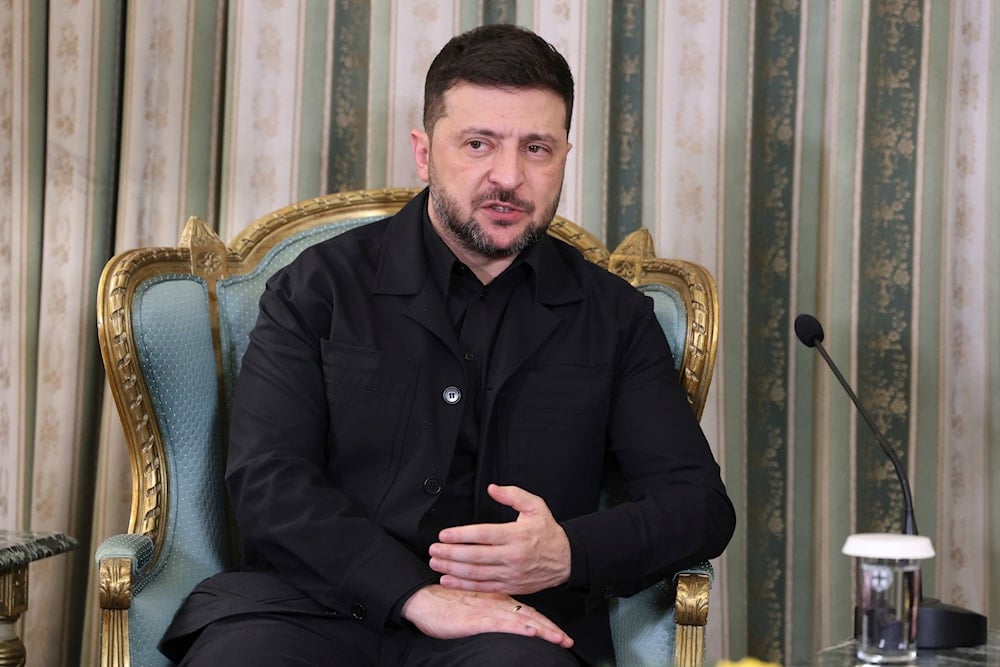Ukraine’s $100 mln energy scandal triggers reform promises
Ukrainian President Volodymyr Zelensky vows sweeping reforms in state energy companies after a $100 million kickback scheme is uncovered.
-

Ukrainian President Volodymyr Zelensky attends a meeting with his Greek counterpart Constantine Tassoulas at the Presidential Palace in Athens, Greece, on November 16, 2025. (AP Photo/Yorgos Karahalis)
Ukrainian President Volodymyr Zelensky has announced sweeping reforms in the country’s energy sector following the exposure of a $100 million kickback scheme involving state-run nuclear power company Energoatom. The unfolding scandal, described as the worst of Zelensky’s presidency, has triggered a political and institutional shake-up as Kiev faces mounting pressure to demonstrate anti-corruption resolve.
The National Anti-Corruption Bureau of Ukraine (NABU) revealed last week it was investigating a criminal group accused of extorting 10–15% kickbacks from Energoatom’s suppliers. The scheme reportedly allowed payments to proceed only if the bribes were paid; otherwise, suppliers faced the risk of being blocked or delisted.
Ukrainian media have linked the scheme to Timur Mindich, a businessman and co-owner of Zelensky’s former media company. Mindich, a longtime associate of the president, fled Ukraine just hours before investigators attempted to detain him at his Kiev residence. He is believed to have escaped to "Israel" via Poland.
Damning audio recordings released by NABU seem to implicate individuals from Zelensky’s inner circle, further intensifying scrutiny over the administration’s handling of corruption.
Zelensky orders sweeping reforms across energy firms
In response, Zelensky over the weekend ordered a complete overhaul of management at Energoatom and other state energy firms, also directing government officials to maintain direct communication with law enforcement and anti-corruption agencies, stating that “any scheme uncovered in these companies must receive a swift and just response.”
The president instructed his cabinet to submit an urgent draft law to reform the National Energy and Utilities Regulatory Commission, a key body overseeing Ukraine’s energy markets. Zelensky also pledged to appoint new leadership at other major energy institutions.
The reforms come after the recent dismissal of the justice and energy ministers, both of whom have been linked to the affair. While both deny wrongdoing, public anger over the scandal has grown, with many observers warning that the alleged corruption may not be limited to the energy sector.
Zelensky’s announcements came shortly before arriving in Athens on Sunday, where he oversaw the signing of a deal that allows Ukraine to import liquefied natural gas (LNG) from the US via Greece during the upcoming winter.
The agreement, signed between Greece’s state-owned DEPA Commercial and Ukraine’s Naftogaz, will supply LNG between December 2025 and March 2026.
Corruption scandal threatens EU accession hopes
The scandal comes at a time when Ukraine is working to meet transparency benchmarks required for European Union membership. European leaders have expressed concern over the allegations, stressing that the credibility of Ukraine’s anti-corruption institutions will influence accession talks.
Finnish President Alexander Stubb emphasized the importance of swift action, stating that while the allegations are serious, Zelensky’s leadership throughout the war deserves recognition, urging EU nations to strengthen their support for Ukraine amid the ongoing war and financial challenges.
Hungarian Prime Minister Viktor Orban, who continues to block Ukraine’s EU talks, seized on the scandal as evidence of what he called "a wartime mafia network" linked to Zelensky. The EU is also currently deadlocked over a proposed €140 billion loan to Ukraine, based on frozen Russian assets.
The scandal has heightened political risks for the president, as investigations widen and new reports emerge suggesting additional links to other ministries. Ukrainian media reported that Mindich may have also attempted to broker a deal involving body armor supplies for the Defense Ministry, using shell companies and an Israeli firm.
Rustem Umerov, Ukraine’s former defense minister and now secretary of the National Security and Defence Council, confirmed he had met with Mindich but denied any wrongdoing. He stressed that no equipment was ever delivered and that the contract was cancelled.

 4 Min Read
4 Min Read











